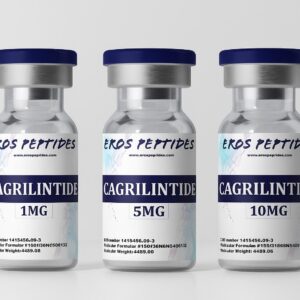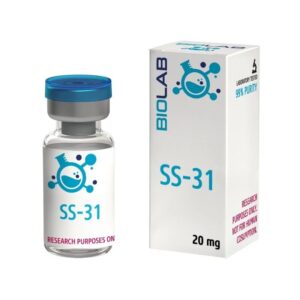Mazdutide: A Next-Generation Peptide for Obesity and Metabolic Disorders
Mazdutide, also known by its research names IBI-362 or LY3305677, is an innovative peptide therapeutic under development for the treatment of obesity and type 2 diabetes. It belongs to a new class of drugs called dual GLP-1 and glucagon receptor agonists, designed to combine the glucose-lowering and appetite-suppressing effects of GLP-1 receptor activation with the energy expenditure benefits of glucagon receptor stimulation. This dual mechanism allows Mazdutide to not only improve glycemic control but also significantly enhance weight loss, addressing two of the most critical factors in metabolic disease management.
Mechanism of Action
Mazdutide’s therapeutic potential lies in its ability to simultaneously modulate two key hormone pathways. GLP-1 (glucagon-like peptide-1) is a naturally occurring incretin hormone that regulates blood sugar by stimulating insulin release, inhibiting glucagon secretion, slowing gastric emptying, and promoting satiety. By activating the GLP-1 receptor, Mazdutide improves postprandial and fasting glucose levels while reducing appetite and caloric intake.
In addition, Mazdutide activates the glucagon receptor, which increases energy expenditure by stimulating lipolysis and thermogenesis. This helps the body burn stored fat more efficiently, complementing the appetite-suppressing effects of GLP-1. The combination of these two mechanisms allows Mazdutide to deliver superior metabolic outcomes compared with drugs that target only one receptor.
Clinical Benefits
Early-phase clinical trials of Mazdutide have demonstrated impressive results in terms of weight reduction and glycemic control. Patients with obesity or overweight conditions experienced clinically significant weight loss, often exceeding 10–15% of body weight over 12–24 weeks of therapy. For individuals with type 2 diabetes, Mazdutide consistently lowered HbA1c levels by 1.5–2%, comparable or superior to existing GLP-1 receptor agonists. These outcomes suggest that Mazdutide could play a transformative role in managing both blood sugar and body weight, two factors that are closely linked in metabolic syndrome and obesity-related disorders.
Advantages Over Single-Receptor Therapies
Traditional GLP-1 receptor agonists, such as semaglutide and liraglutide, primarily focus on lowering blood glucose and suppressing appetite. While effective, their weight-loss outcomes are sometimes limited, particularly in individuals with severe obesity. By incorporating glucagon receptor activation, Mazdutide not only enhances weight reduction through increased energy expenditure but also helps maintain lean muscle mass, which is often lost during rapid weight loss. This dual action positions Mazdutide as a potential superior alternative to single-receptor drugs in the metabolic therapy landscape.
Administration and Dosing
Mazdutide is administered via subcutaneous injection, typically on a weekly basis, similar to other GLP-1-based therapies. Dosing protocols are designed to start at lower doses to minimize gastrointestinal side effects such as nausea, vomiting, or diarrhea, with gradual titration to achieve optimal therapeutic outcomes. The once-weekly dosing schedule improves patient adherence and convenience, making long-term therapy more manageable.
Safety and Tolerability
Early trials indicate that Mazdutide is generally well-tolerated. Gastrointestinal disturbances are the most common side effects and tend to be mild to moderate, decreasing over time as the body adjusts to the treatment. Cardiovascular safety data is still being collected, but preliminary findings are encouraging. Long-term studies will be essential to fully evaluate its safety profile, particularly in populations with obesity-related comorbidities.
Future Potential
Mazdutide represents a promising advancement in metabolic therapy, combining two complementary mechanisms into a single treatment. Its dual receptor activity offers the potential to significantly improve weight loss, glycemic control, and overall metabolic health. If approved, Mazdutide could become a cornerstone therapy for obesity, type 2 diabetes, and associated cardiometabolic disorders, offering patients a more effective and holistic approach to disease management.
Conclusion
Mazdutide (IBI-362) is a next-generation dual GLP-1 and glucagon receptor agonist designed to address the dual challenges of obesity and type 2 diabetes. By combining appetite suppression, enhanced energy expenditure, and improved glycemic control, it represents a significant advancement over single-target therapies. Clinical data to date highlights its efficacy, safety, and potential to reshape the treatment landscape for metabolic disorders, offering hope to millions of patients worldwide struggling with obesity and diabetes.






Reviews
There are no reviews yet.